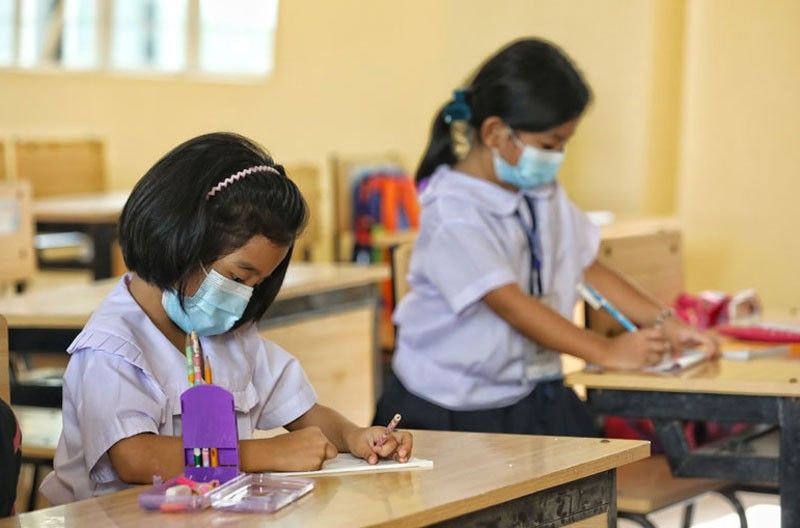Explainer: With students’ poor literacy, are all teachers now ‘reading teachers’?

MANILA, Philippines — One of the Department of Education’s most wide-scale attempts to arrest students’ declining reading comprehension skills will start on Friday with the rollout of a new weekly program, where teachers are tasked to carve out half of the day to implement everything from reading clubs to read-aloud activities.
But with the burden falling on teachers to make DepEd’s “Catch Up Fridays” a success, a University of the Philippines (UP) College of Education professor said that what spells the difference is still quality reading instruction — which not all teachers provide.
“As far as education and reading are concerned, we cannot give what we do not have,” said UP College of Education faculty member Portia Padilla.
“There are studies that show that even some of our teachers who currently teach reading do not possess the basic competencies needed to teach reading,” Padilla told Philstar.com.
At least 90% of Filipino children aged 10 struggle to read or understand simple text, according to the World Bank’s 2022 data on learning poverty. But even before the COVID-19 pandemic set back students’ learning, the pre-pandemic figure pegged learning poverty in the Philippines at 70%.
For DepEd to acknowledge students’ reading problem — which has persisted through different administrations — “is a good step to take for starters” Padilla said.
But whether the program will get all students to pick up their reading material of choice every week — and improve their reading abilities in the process — is a different story, Padilla added.
Teacher training non-negotiable
Padilla, who specializes in reading and literacy education, said some teachers who are instructing beginning readers “do not know how to give the correct sounds of letters and have been teaching students the wrong sounds.”
“So students end up not learning how to read. We have teachers who do not know how to count syllables in words they hear,” Padilla said.
Citing studies conducted by international institutions and non-government organizations, Padilla said many elementary public school teachers also themselves “struggle to read beyond the Grade 6 level.”
One of these studies was carried out by private firm Cardno Emerging Markets in 2017 and involved an assessment of teachers’ skills following DepEd’s program in partnership with the Australian government in the Bangsamoro region (then-ARMM).
The study showed that more than 200 teachers in the Bangsamoro region who were part of DepEd’s reading program scored below 50% in reading comprehension even after undergoing training.
The report also noted that in terms of reading fluency — the speed and accuracy at which one decodes words — only around 35% of teachers were at least proficient after the training program.
A different study — an end-of-project review of a 2011 United States Agency for International Development education program — found that only around half of the 1,058 English teachers assessed met the minimum 50% score level in a test that covers reading comprehension, structure of language and written expression.
Continuous teacher training opportunities are a must, “especially if they went into the teaching profession with insufficient knowledge and skills in teaching reading,” Padilla said.
“If nine out of ten students cannot read, what will they do on Fridays? Are the teachers equipped enough and ready to provide remedial learning reading instruction?” Padilla said.
The scope of the country’s learning crisis rooted in poor literacy has made several education officials remark that all teachers are challenged to be “reading teachers” regardless of the subject they teach.
But this is “easier said than done,” Padilla said.
“Sadly at present, there are a good number of reading teachers whose reading skills themselves would have to be improved. You have many teachers as well whose content and pedagogical knowledge in reading needs to be improved as well,” Padilla added.
“So if you want all the teachers to be reading teachers not just in words but in deeds — you have to train them. And that’s a gargantuan task,” the UP professor added.
Padilla highlighted the need to train teachers beyond one-day or one-week workshops to make quality reading instruction stick — the core component of the department’s National Reading Program, which targets both non- and frustrated readers.
“It’s the follow-up and follow-through on the ground that matters,” she added.
Amid a flurry of policies and programs in response to the Philippines’ education crisis, lawmakers in 2023 also saw the need to improve the quality of teacher education after years of consistently poor passing rates in the Licensure Exam for Teachers (LET).
According to the Philippine Business for Education, less than half of schools offering teacher education had above-average passing rates in the LET since 2010. Meanwhile, only 2% of schools offering teacher education can be classified as "high-performing" or those with LET passing rates of at least 75%.
‘It takes a village’
Teachers can only do so much with limited resources and perennial problems with classroom and learning resource shortages, Padilla said.
“There are so many problems connected to the reading and learning crisis. You have overcrowded classes, very limited reading materials that are interesting to the kids. You have overloaded teachers,” the professor added.
Intervention programs and the implementation of a decades-old law requiring the establishment of a library in each city or municipality can spell the difference, Padilla said, adding that it “takes a village to raise a reader.”
“The concern for the literacy of our youth should go beyond slogans and sound bites delivered during press conferences, speeches, and interviews. Lip service doesn't cut it,” the professor said.
- Latest
- Trending































